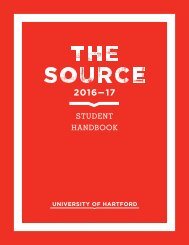advising
Create successful ePaper yourself
Turn your PDF publications into a flip-book with our unique Google optimized e-Paper software.
HILLYER COLLEGE<br />
Advising Information: 860.768.4697 or 860.768.5013<br />
MUB 200 World Music Survey [3]<br />
This is an introductory course to world music and some of the basic<br />
issues important for an understanding of music in culture and music<br />
as culture, including discussion of major musical cultures throughout<br />
the world, with various listening, reading, and writing assignments.<br />
Three hours weekly.<br />
MUB 210 Global Pop Music [3]<br />
The globalization of culture has produced a world that has an<br />
uninhibited circulation of people, ideas, and things. There is no<br />
better place to observe this “grooving together” of cultures than in<br />
global pop music. This course examines the forces that enable the<br />
movement of music and musicians around the world and that give<br />
global music its persuasive power. Topics include music as expressive<br />
culture, music production, ethnicity and identity in pop music,<br />
music as symbol, cross-cultural collaborations in popular music, and<br />
music as a force that transcends sociological, political, and national<br />
boundaries.<br />
PHB 110 Introduction to Philosophy [3]<br />
A first course in philosophy that stresses the basic human questions.<br />
Major concerns include the task of philosophy, the nature of man,<br />
the self, the freedom to choose, the nature of values, and the question<br />
of morality. Specific philosophical outlooks are briefly discussed; a<br />
more extensive examination is given to the nature of religion, belief in<br />
God, and Oriental thought.<br />
PHB 120 Ethics: Contemporary Moral Problems [3]<br />
An introductory course for examination and discussion of<br />
contemporary moral problems. Begins with identifying the moral<br />
experience and constructing moral situations. The moral problems<br />
include truth, suicide, sexual integrity, violence, punishment, and<br />
issues in biomedical ethics.<br />
PHB 232 Biomedical Ethics [3]<br />
A philosophical discussion of ethical considerations arising from<br />
aspects of biological and medical research and medical practice. The<br />
course will examine issues of relevance to both the researcher and the<br />
medical professional, such as euthanasia, animal experimentation,<br />
abortion, and patients’ rights. Prerequisite: PHB 110 or PHB 120 or<br />
permission of instructor.<br />
SDB 110 Effective Speech [3]<br />
Selection, organization, and development of ideas for effective<br />
delivery in extemporaneous or manuscript form. Course includes<br />
preparing transparencies for overhead projector presentations<br />
and making videotapes of speeches. Some attention is given to<br />
impromptu speeches, discussion, parliamentary procedure, critical<br />
evaluating, and oral reading.<br />
SDB 120 Introduction to Theatre [3]<br />
Course planned to develop an understanding and appreciation of<br />
dramatic art through the study of the contributions made to it by<br />
playwrights, actors, directors, designers, technicians, and theatre<br />
builders. Also, the study of some of the major forms and styles<br />
of drama, as well as discussion of selected modern plays and<br />
dramatic criticism. Course includes some history of the American<br />
film and television industry and consideration of the current<br />
theatrical job market.<br />
Science Electives<br />
BYB 210-211 General Biology [4]<br />
Recommended for freshmen only if they have a science focus.<br />
Introductory survey of the life sciences. First semester (BYB 210):<br />
basic concepts of inorganic and biological chemistry, cell structures<br />
and functions, metabolic pathways, cell reproduction, and genetics.<br />
Second semester (BYB 211): anatomical and physiological principles<br />
of animal organ systems with emphasis on humans. Three hours of<br />
lecture and three hours of laboratory each week. Laboratory fee.<br />
CSB 110 Computer Concepts [3]<br />
This is a one-semester introduction to computers. Topics include<br />
the fundamentals of computer hardware and software, computer<br />
programming concepts, computer applications using spreadsheets<br />
and databases, and network resources. Prerequisite: MAB 110 or its<br />
equivalent. Laboratory fee.<br />
SCB 110 Introduction to Human Nutrition [3]<br />
An introductory course that explores the role of nutrition science<br />
in health promotion and disease prevention. Topics include an<br />
overview of digestion; metabolism of protein, carbohydrate, fat, and<br />
alcohol; the biological role of vitamins, minerals, water, fiber, and<br />
phytochemicals; problems associated with nutrient deficiencies and<br />
toxicities; energy balance and weight control; and how to assess<br />
individual dietary intake and nutritional status.<br />
Social Science Electives<br />
AFB 110 Study of the Black Experience [3]<br />
An introductory course that explores the nature and scope of<br />
Africana studies through an examination of the various dimensions<br />
of the black experience.<br />
ANB 110 Cultural Anthropology[3]<br />
An exploration of human social organization and diversity. Students<br />
study the beliefs and behaviors of a variety of world cultures through<br />
religion, kinship, marriage, subsistence, personality, and worldview.<br />
Emphasis is given to examining the lifeways of traditional societies,<br />
their continuity, and change.<br />
ECB 110-111 Principles of Economics [3]<br />
The operation of modern economic society. Introductory analysis<br />
of production, exchanges, prices, distribution, money and banking,<br />
public finance, labor, the level of employment, the determinants of<br />
national income, and international trade. ECB 110 prerequisite:<br />
MAB 111; ECB 111 prerequisite: ECB 110.<br />
GVB 110 American National Government [3]<br />
An introductory overview of the American political process and its<br />
governmental structure. Attention is directed toward the principles,<br />
structure, and role played by the national government in the<br />
American political process.<br />
GVB 120 The American Judicial System: Process and Issues [3]<br />
A survey of the American judicial process, its structure, principles,<br />
and functions within the context of the American political process. A<br />
topical approach is used, with consideration given to the Constitutional<br />
basis of the national judiciary, the dynamics of judicial federalism, and<br />
an examination of the court’s general role in the national development<br />
of civil rights and liberties and due process of law.<br />
49



